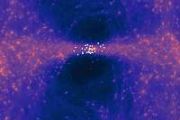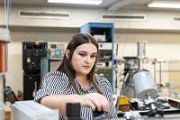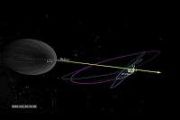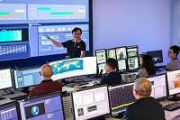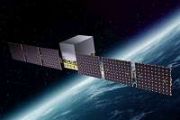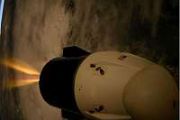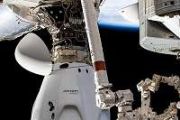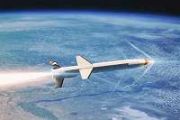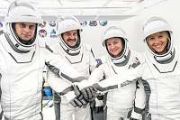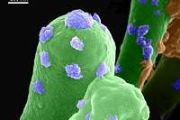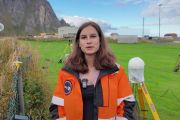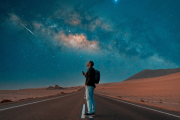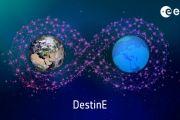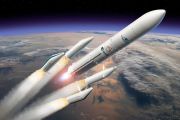
Copernical Team
Northrop Grumman awarded US Space Force contract for deep-space advanced radar
 Northrop Grumman Corporation has been awarded a $341 million contract by the U.S. Space Force (USSF) Space Systems Command (SSC) to develop, test and deliver a Deep-Space Advanced Radar Capability (DARC) in support of its Space Domain Awareness mission.
"The DARC program will field a resilient ground-based radar providing our nation with significantly enhanced space domain awareness for ge
Northrop Grumman Corporation has been awarded a $341 million contract by the U.S. Space Force (USSF) Space Systems Command (SSC) to develop, test and deliver a Deep-Space Advanced Radar Capability (DARC) in support of its Space Domain Awareness mission.
"The DARC program will field a resilient ground-based radar providing our nation with significantly enhanced space domain awareness for ge Robotic cubes shapeshift in outer space
 If faced with the choice of sending a swarm of full-sized, distinct robots to space, or a large crew of smaller robotic modules, you might want to enlist the latter. Modular robots, like those depicted in films such as "Big Hero 6," hold a special type of promise for their self-assembling and reconfiguring abilities. But for all of the ambitious desire for fast, reliable deployment in domains ex
If faced with the choice of sending a swarm of full-sized, distinct robots to space, or a large crew of smaller robotic modules, you might want to enlist the latter. Modular robots, like those depicted in films such as "Big Hero 6," hold a special type of promise for their self-assembling and reconfiguring abilities. But for all of the ambitious desire for fast, reliable deployment in domains ex SpaceX to launch IoT tech demo satellites for Plan-S
 Plan-S Satellite and Space Technologies, a Turkish provider of end-to-end satellite solutions for global IoT services, have signed a series of agreements to launch three IoT tech demo satellites onboard SpaceX's Falcon 9 via Exolaunch, a global leader in launch, in-space logistics and deployment services for small satellites. The satellites being built by Plan-S will be launched in the second ha
Plan-S Satellite and Space Technologies, a Turkish provider of end-to-end satellite solutions for global IoT services, have signed a series of agreements to launch three IoT tech demo satellites onboard SpaceX's Falcon 9 via Exolaunch, a global leader in launch, in-space logistics and deployment services for small satellites. The satellites being built by Plan-S will be launched in the second ha Sol 3395: Last Chance for Contact
 Before the science team says "OK TO GO!," today's plan involves getting one of the last looks at the rocks right below the Greenheugh Pediment, some observations at the contact between them, and some higher up on Gediz-Vallis Ridge.
The rover will collect two APXS measurements on "Galdenoch," one a brushed location and another offset from it, including some MAHLI images (see image) to docu
Before the science team says "OK TO GO!," today's plan involves getting one of the last looks at the rocks right below the Greenheugh Pediment, some observations at the contact between them, and some higher up on Gediz-Vallis Ridge.
The rover will collect two APXS measurements on "Galdenoch," one a brushed location and another offset from it, including some MAHLI images (see image) to docu Thales Alenia Space wins study contract to develop payload to extract Oxygen on the Moon
 Thales Alenia Space, a joint venture between Thales (67%) and Leonardo (33%), has signed a study contract with the European Space Agency worth one million euros for a payload concept to extract oxygen from Moon rock.
For a sustainable habitation on the Moon, humans will need to utilise resources that they find on the Moon rather than transport these resources from Earth; one of these resou
Thales Alenia Space, a joint venture between Thales (67%) and Leonardo (33%), has signed a study contract with the European Space Agency worth one million euros for a payload concept to extract oxygen from Moon rock.
For a sustainable habitation on the Moon, humans will need to utilise resources that they find on the Moon rather than transport these resources from Earth; one of these resou MIT Lunar Station Corp helps support safe lunar missions
 This year NASA hopes to return astronauts to the Moon as early as March or April.
Strategically, the Moon has something essential for life in space: water. Lunar ice can supply oxygen for human life and hydrogen fuel for deep space travel. But, navigating the dangerous Lunar surface is not for the faint of heart.
You wouldn't build a home on sand. Would you? The Moon is no differen
This year NASA hopes to return astronauts to the Moon as early as March or April.
Strategically, the Moon has something essential for life in space: water. Lunar ice can supply oxygen for human life and hydrogen fuel for deep space travel. But, navigating the dangerous Lunar surface is not for the faint of heart.
You wouldn't build a home on sand. Would you? The Moon is no differen NASA opens second phase of $5 Million Lunar Power Prize Competition
 Under Artemis, NASA plans to return to the Moon using innovative technologies to explore more of the lunar surface than ever before. This will require lunar surface systems that can deliver continuous, reliable power to support mining and construction, research activities, and human habitation.
The newest phase of NASA's Watts on the Moon Challenge offers up to $4.5 million in prizes to de
Under Artemis, NASA plans to return to the Moon using innovative technologies to explore more of the lunar surface than ever before. This will require lunar surface systems that can deliver continuous, reliable power to support mining and construction, research activities, and human habitation.
The newest phase of NASA's Watts on the Moon Challenge offers up to $4.5 million in prizes to de Clean driving technology enables cleaner rocket fuel
 A chemical used in electric vehicle batteries could also give us carbon-free fuel for space flight, according to new UC Riverside research.
In addition to emission reductions, this chemical also has several advantages over other types of rocket fuels: higher energy, lower costs, and no requirement for frozen storage.
The chemical, ammonia borane, is currently used for storing the hyd
A chemical used in electric vehicle batteries could also give us carbon-free fuel for space flight, according to new UC Riverside research.
In addition to emission reductions, this chemical also has several advantages over other types of rocket fuels: higher energy, lower costs, and no requirement for frozen storage.
The chemical, ammonia borane, is currently used for storing the hyd Rocket Lab officially opens third launch pad, Next launch within a week
 Rocket Lab USA, Inc (Nasdaq: RKLB) has announced the completion of its second orbital launch pad at Launch Complex 1 in New Zealand - the Company's third dedicated pad for its Electron rocket - and confirmed the new pad's first mission will be a dedicated commercial launch scheduled to lift-off within a week's time.
Pad B is based within Rocket Lab Launch Complex 1, the world's first priva
Rocket Lab USA, Inc (Nasdaq: RKLB) has announced the completion of its second orbital launch pad at Launch Complex 1 in New Zealand - the Company's third dedicated pad for its Electron rocket - and confirmed the new pad's first mission will be a dedicated commercial launch scheduled to lift-off within a week's time.
Pad B is based within Rocket Lab Launch Complex 1, the world's first priva Ukraine crisis challenges International Space Station cooperation
 The crisis over Russia's Ukrainian aggression presents NASA and other space agencies with the most serious diplomatic strain in the 22-year history of the International Space Station partnership, experts said.
Russia is a major partner with the United States, Europe, Japan and Canada in the space station's maintenance and operation.
Russia provides critical cargo and crew transport,
The crisis over Russia's Ukrainian aggression presents NASA and other space agencies with the most serious diplomatic strain in the 22-year history of the International Space Station partnership, experts said.
Russia is a major partner with the United States, Europe, Japan and Canada in the space station's maintenance and operation.
Russia provides critical cargo and crew transport, 

